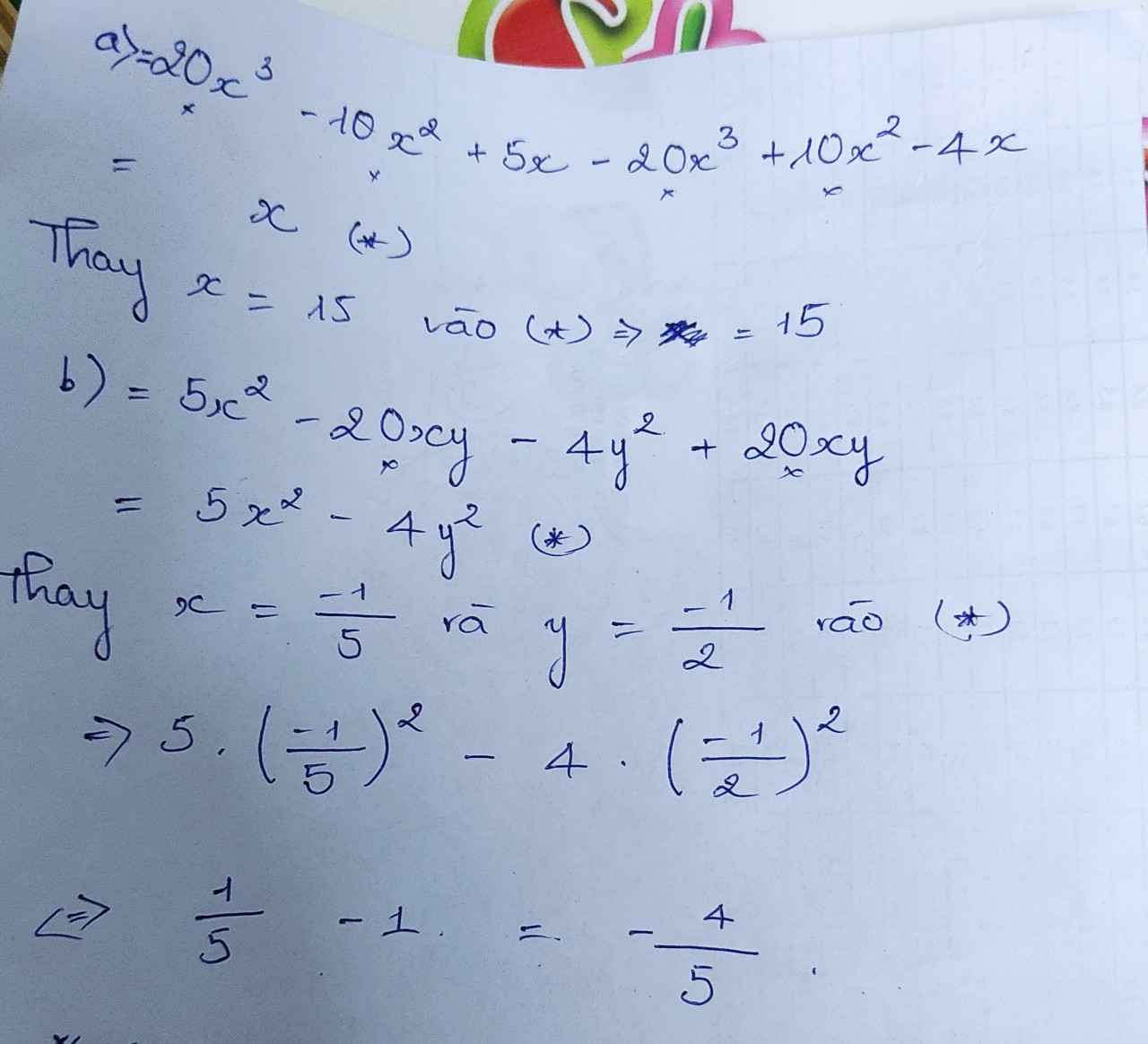Hãy nhập câu hỏi của bạn vào đây, nếu là tài khoản VIP, bạn sẽ được ưu tiên trả lời.

a) \(\left(3x-5\right)\left(9x^2+15x+25\right)\)
\(=\left(3x\right)^3-5^3\)
\(=27x^3-125\)
b) \(\left(2x+7\right)\left(x^2-14x+49\right)-2x\left(2x-1\right)\left(2x+1\right)\)
\(=2x^3-28x^2+98x+7x^2-98x+343-2x\left(4x^2-1\right)\)
\(=2x^3-28x^2+7x^2+343-8x^3+2x\)
\(=-6x^3-21x^2+343+2x\)
c) \(\left(4x-7\right)\left(16x^2+28x+49\right)\left(3x+1\right)\left(9x^2-3x+1\right)-9x\left(3x^2-1\right)\)
\(=\left(64x^3-343\right)\left(3x+1\right)\left(9x^2-3x+1\right)-27x^3+9x\)
\(=\left(6x^3-343\right)\left(27x^3+1\right)-27x^3+9x\)
\(=1728x^6+64x^3-9261x^3-343-27x^3+9x\)
\(=1728x^6-9224x^3-343+9x\)

d: Ta có: \(4x\left(2x+3\right)-8x\left(x+4\right)\)
\(=8x^2+12x-8x^2-32x\)
=-20x
e: Ta có: \(2x\left(5x+2\right)+\left(2x-3\right)\left(3x-1\right)\)
\(=10x^2+4x+6x^2-2x-9x+3\)
\(=16x^2-7x+3\)
f: Ta có: \(x\left(x+2\right)^2-\left(x+1\right)^3+3\left(x-1\right)\left(x+1\right)\)
\(=x^3+4x^2+4x-x^3-3x^2-3x-1+3x^2-3\)
\(=4x^2+x-4\)

\(A=\left(2x-3\right).\left(3x^2+2x-1\right)-\left(4x+1\right)\cdot\left(x-1\right)\)
\(A=6x^3+4x^2-2x-9x^2-6x+3-\left(4x^2-4x+x-1\right)\)
\(A=6x^3+4x^2-2x-9x^2-6x+3-4x^2+4x-x+1\)
\(A=6x^3-9x^2-5x+4\)
Với \(x=\frac{1}{2}\).Ta có :
\(A=6.\left(\frac{1}{2}\right)^3-9.\left(\frac{1}{2}\right)^2-5.\frac{1}{2}+4\)
\(A=\frac{3}{4}-\frac{9}{4}-\frac{5}{2}+4\)
\(\Rightarrow A=0\)

A = (x + 2)3 - (x - 2)3 - 6x(2x + 1)
= x3 + 6x2 + 12x + 8 - (x3 - 6x2 + 12x - 8) - 12x2 - 6x
= x3 + 6x2 + 12x + 8 - x3 + 6x2 - 12x + 8 - 12x2 - 6x
= (x3 - x3) + (6x2 + 6x2 - 12x2) + (12x - 12x - 6x) + (8 + 8)
= -6x + 16
=> có phụ thuộc vào biến x
B = 8(x - 1)(x2 + x + 1) - (2x - 1)(4x2 + 2x + 1)
= 8(x3 - 1) - (8x3 - 1) (sử dụng hằng đẳng thức thứ 6)
= 8x3 - 8 - 8x3 + 1 = (8x3 - 8x3) + (-8 + 1) = -7
=> không phụ thuộc vào biến x
\(A=\left(x+2\right)^3-\left(x-2\right)^3-6x\left(2x+1\right)\)
\(=x^3+6x^2+12x+8-x^3+6x^2-12x+8-12x^2-6x\)
\(=-6x+16\)
Vậy biểu thức A phụ thuộc vào biến x
\(B=8\left(x-1\right)\left(x^2+x+1\right)-\left(2x-1\right)\left(4x^2+2x+1\right)\)
\(=8x^3-8-8x^3+1\)
\(-7\)
Vậy biểu thức B không phụ thuộc vào biến x

1: A=4x^2+12x+9-4x^2+4x-1-6x=10x+8
Khi x=201 thì A=10*201+8=2018
2: B=4x^2+20x+25-4x^2+12=20x+37
Khi x=1/20 thì B=1+37=38
1, \(A=\left(2x+3\right)^2-\left(2x-1\right)^2-6x\)
\(A=\left[\left(2x+3\right)+\left(2x-1\right)\right]\left[\left(2x+3\right)-\left(2x-1\right)\right]-6x\)
\(A=\left(2x+3+2x-1\right)\left(2x+3-2x+1\right)-6x\)
\(A=4\left(4x+2\right)-6x\)
\(A=16x+8-6x\)
\(A=10x+8\)
Thay \(x=201\) vào A ta có:
\(A=10\cdot201+8=2010+8=2018\)
Vậy: ....
2, \(B=\left(2x+5\right)^2-4\left(x+3\right)\left(x-3\right)\)
\(B=\left(2x+5\right)^2-4\left(x^2-9\right)\)
\(B=4x^2+20x+25-4x^2+36\)
\(B=20x+61\)
Thay \(x=\dfrac{1}{20}\) vào B ta có:
\(B=20\cdot\dfrac{1}{20}+61=1+61=62\)
Vậy: ...

a: \(\left(2x+1\right)^2+2\left(4x^2-1\right)+\left(2x-1\right)^2\)
\(=\left(2x+1\right)^2+2\left(2x+1\right)\left(2x-1\right)+\left(2x-1\right)^2\)
\(=\left(2x+1+2x-1\right)^2=\left(4x\right)^2=16x^2\)
b: \(\left(x^2-1\right)\left(x+2\right)-\left(x-2\right)\left(x^2+2x+4\right)\)
\(=x^3+2x^2-x-2-x^3+8\)
\(=2x^2-x+6\)
a) \(\left(2x+1\right)^2+2\left(4x^2-1\right)+\left(2x-1\right)^2\)
\(=\left(2x+1\right)^2+2\left(2x+1\right)\left(2x-1\right)+\left(2x-1\right)^2\)
\(=\left[\left(2x+1\right)+\left(2x-1\right)\right]^2\)
\(=\left(2x+1+2x-1\right)^2\)
\(=\left(4x\right)^2\)
\(=16x^2\)
b) \(\left(x^2-1\right)\left(x+2\right)-\left(x-2\right)\left(x^2+2x+4\right)\)
\(=\left(x^3+2x^2-x-2\right)-\left(x^3-8\right)\)
\(=x^3+2x^2-x-2-x^3+8\)
\(=2x^2-x+6\)

a)
( 3x - 5 ) ( 2x + 11 ) - ( 2x + 3 ) ( 3x + 7 )
= ( 6x^2 + 33x - 10x - 55 ) - ( 6x^2 + 14x + 9x + 21 )
= ( 6x^2 + 23x - 55 ) - ( 6x^2 + 23x + 21 )
= 6x^2 + 23x - 55 - 6x^2 - 23x - 21
= ( 6x^2 - 6x^2 ) + ( 23x - 23x ) - ( 55 + 21 )
= -76
=> với mọi x thì giá trị của biểu thức luôn bằng -76
=> đpcm
b)c) tương tự
cái này khá dài nên mik ns lun nha
: bạn nhân đa thức vs đa thức làm bình thường vậy thôi . kết quả là 1 số tự nhiên thì nó kg phụ thuộc vào biến nha
chuk hok tốt


\(M=\left(7-2x\right)\left(4x^2+14x+49\right)-\left(64-8x^3\right)\)
\(M=\left(7-2x\right)\left[\left(2x\right)^2+2x\cdot7+7^2\right]-\left(64-8x^3\right)\)
\(M=\left[7^3-\left(2x\right)^3\right]-\left(64-8x^3\right)\)
\(M=343-8x^3-64+8x^3\)
\(M=279\)
Vậy M có giá trị 279 với mọi x
\(P=\left(2x-1\right)\left(4x^2-2x+1\right)-\left(1-2x\right)\left(1+2x+4x^2\right)\)
\(P=8x^3-4x^2+2x-4x^2+2x-1-1+8x^3\)
\(P=16x^3-8x^2+4x-2\)
Thay \(x=10\) vào P ta có:
\(P=16\cdot10^3-8\cdot10^2+4\cdot10-2=15238\)
Vậy P có giá trị 15238 tại x=10
a: M=343-8x^3-64+8x^3=279
b: P=8x^3-4x^2+2x-4x^2+2x-1-1+8x^3
=16x^3-8x^2+4x-2
=16*10^3-8*10^2+4*10-2=15238